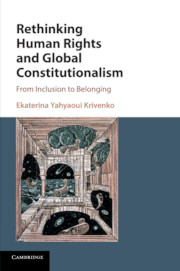Book contents
- Rethinking Human Rights and Global Constitutionalism: From Inclusion to Belonging
- Rethinking Human Rights and Global Constitutionalism
- Copyright page
- Dedication
- Contents
- Acknowledgements
- Introduction
- 1 Paradigms of Global Constitutionalism
- 2 Mechanisms and Modalities of Human Rights in Global Constitutionalism
- 3 The Other of Human Rights and Global Constitutionalism
- 4 From Inclusion to Belonging
- Bibliography
- Index
- References
Bibliography
Published online by Cambridge University Press: 13 October 2017
- Rethinking Human Rights and Global Constitutionalism: From Inclusion to Belonging
- Rethinking Human Rights and Global Constitutionalism
- Copyright page
- Dedication
- Contents
- Acknowledgements
- Introduction
- 1 Paradigms of Global Constitutionalism
- 2 Mechanisms and Modalities of Human Rights in Global Constitutionalism
- 3 The Other of Human Rights and Global Constitutionalism
- 4 From Inclusion to Belonging
- Bibliography
- Index
- References
- Type
- Chapter
- Information
- Rethinking Human Rights and Global ConstitutionalismFrom Inclusion to Belonging, pp. 142 - 148Publisher: Cambridge University PressPrint publication year: 2017



